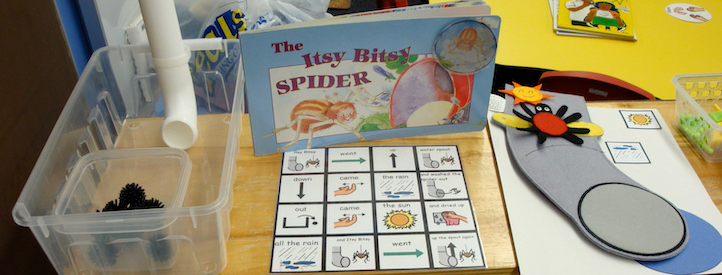Overview

This module is written in a similar format as the other WATI assessment process modules. However, through experience the authors have found that when assessing the need for assistive technology of students with complex needs, the adults around them need to spend more time asking the right questions about how their students are affected by their multiple disabilities and how their environment needs to be engineered to meet their unique needs. For example, the meaning of their limited movements are sometimes subtle and can be missed without careful observation.
This module uses the format of the AT Decision-Making Process to present questions that will help develop an understanding of the student and his or her environment. Instead of a continuum of tools, the module provides a tool belt of resources to help answer questions for which answers are still lacking. Subsequently, use the WATI assessment process modules to identify tasks and tools. This module is the first of two parts. The second part, AT for Students With Complex Needs - WATI, focuses on communication supports, essential elements for successful use of AT, and active involvement in school settings.
Estimated Time to Complete: 1 1/2 hours
- What's Included
- 33 pages
- Pre/post-assessments
- Optional $15 certficate
- Identify when additional information about a student is needed.
- Describe what "learned helplessness" is and implement strategies to prevent "learned helplessness."
- Explain the role of staff attitude on quality programming for students with CN.
- Describe the key elements of a responsive educational environment.
- Identify at least one tool that assists in program development.
Module Authors
Shelly Weingarten, M.Ed., OTR
Shelly Weingarten, OTR, MEd is an Occupational Therapist (BS Occupational Therapy- University of Wisconsin-Milwaukee 1982, MEd- Special Education with an emphasis in Assistive Technology 2006). Shelley also has a certification in sensory integrating. Shelly worked for the Cooperative Educational School Agency in Wisconsin as an itinerant occupational therapist for 33 years. During that time, she was also a consultant for WATI (Wisconsin Assistive Technology Initiative). She currently is working with MJ Care and Milwaukee Center for Independence.
Jill Gierach, MSE, ATP
Jill Gierach is an assistive technology (AT) consultant and trainer in private practice. She holds a master's degree in special education with an emphasis on students with multiple disabilities. She is state licensed and nationally certified through RESNA in assistive technology. In 1995, she joined the newly formed Wisconsin Assistive Technology Initiative (WATI). She has co-authored AT training and assessment materials distributed by the project. Jill took on the role of the project's Director during the last few years of the funding. She is also a certified literacy coach who supports teachers to implement AT. She is a contributing author of the Praeger Handbook of Learning and The Brain.
Module Content Provided By
This module was developed in collaboration with WATI and provides updated content from the Assessing Students' Needs for Assistive Technology (ASNAT) - IDEA discretionary grant #: 9906-23. 1992-2009
Modules on this site are always free. If you would like proof of completion, you can purchase a certificate when you have successfully completed this module. The certificate will provide contact hours for this module.
Graduate credit for courses is available through OCALI's partnership with Ashland University. Access information about course options and semester dates in the Search.